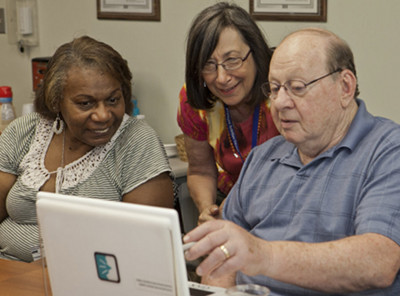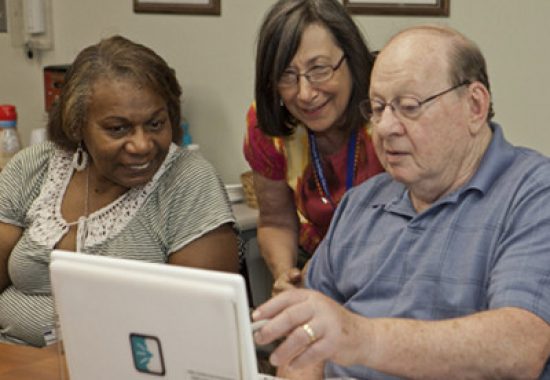
The MossRehab Aphasia Center Advanced Clinical Therapy (ACT) Program is a unique-to-the-region collaboration among MossRehab Hospital, Moss Rehabilitation Research Institute (MRRI), and the MossRehab Aphasia Center bringing ‘up-to-the-minute’ aphasia rehabilitation research directly into the clinical setting.
At the time of the inception of the ACT program, treatment was less commonly available for those with chronic aphasia due to the prevailing ‘myth of the plateau’, which suggested that continued improvement was not possible after more than a few months post-stroke. However, a core group of researchers around the world, including scientists at MRRI, were studying new treatments and documenting improvement in people with chronic aphasia. This work was creating a stronger evidence base showing that individuals with aphasia were responsive to treatment even years after their stroke. ACT speech-language pathologist emerita Paula Sobel, MA, CCC-SLP, recently recounted her experience working in the 1990s as a research speech-language pathologist evaluating connected speech samples as part of a project being led by MRRI co-founder Myrna Schwartz, PhD. Although blinded to what was happening during the sessions in the study, it was clear to Ms. Sobel that participants’ language was improving. The treatment those participants received, published under the name Mapping Therapy, has since been cited in more than 200 scientific journal articles, and it continues to be utilized to treat grammatical impairments for those with aphasia.
In addition to Mapping Therapy, MRRI scientists have contributed to the development of the Philadelphia Naming Test, an image-based naming test developed to explore lexical access in people with and without aphasia. This test is used within MossRehab and the ACT program, as well as around the world. In addition, researchers at MRRI worked to develop MossTalk Words and the subsequent MossTalk Words 2. These are evidence-based, computer-assisted treatment programs designed specifically to optimize word comprehension and production in people with aphasia. Once developed, this technology was incorporated into treatment plans to enhance rehabilitation in people with aphasia.
The ACT program was developed to bridge this type of cutting edge research with speech-language pathologists’ clinical expertise for the benefit of individuals with aphasia. Through this program, the MossRehab Aphasia Center became a leader in implementing aphasia rehabilitation approaches based on models of how language is processed in the brain, combined with a functional, person-centered approach to developing direct treatment and home practice programs. Informed by ‘hot-off-the-press’ research findings, speech-language pathologists who understood the methods for taking a theoretically-motivated case-report approach to their practice began to work with individuals with chronic aphasia.
Today, the speech-language pathologists within the ACT program continue to communicate directly with MRRI researchers, staying apprised of the latest aphasia rehabilitation research for those with chronic aphasia, as well as primary progressive aphasia. Their work incorporates a wide variety of evidence-based assessment and treatment protocols individualized to each patient and grounded in the Life Participation Approach to Aphasia. The Life Participation Approach to Aphasia prioritizes collaborating with each individual to develop and progress toward the goals they have for themselves.
Learn more information about the ACT program and other MossRehab Aphasia Center services.


2 comment on “The Advanced Clinical Therapy Program Incorporates Research Findings to Improve Clinical Care for People with Aphasia”